Erwadi
Erwadi is a village in Ramanathapuram District, Tamil Nadu. It belongs to Kilakarai Taluk and town panchayat. The village is the location of the grave and shrine of Qutb-us-Sultan Syed Ibrahim Badshah Shaheed, a ruler of Medina. Erwadi also belongs to Kadaladi assembly constituency, which is a part of Ramanathapuram (Lok Sabha constituency). After the delimitations in 2009, Erwadi was joined to the Ramanathapuram assembly constituency. Erwadi is the second largest contributor for the revenue of Ramanthapuram District.
Erwadi
Erwadi Dargah Shariff | |
|---|---|
village | |
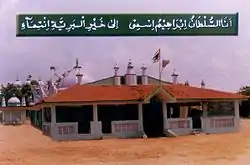 Erwadi Dargah | |
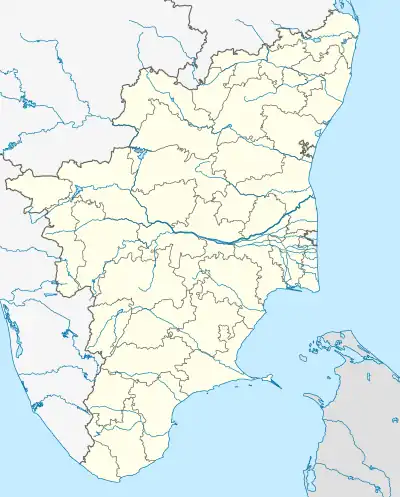 Erwadi Location in Tamil Nadu, India | |
| Coordinates: 9.2082197°N 78.7100988°E | |
| Country | |
| State | Tamil Nadu |
| District | Ramanathapuram district |
| Languages | |
| • Official | Tamil |
| Time zone | UTC+5:30 (IST) |
| Website | www |
History
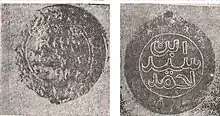
Importance in Islam
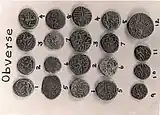
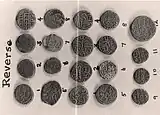
Sultan Syed Ibrahim Shaheed sent Sikandar Badusha to the Pandiyan ruler Thiru Pandiyan in Madurai to convert him to Islam, but he refused. Shaheed's troops won the ensuing war and Sultan Sikandar Badusha became king in Madurai. Shaheed's troops marched towards Bouthramanickapattinam (Kilakarai). Shaheed Badusha tried to convert King Vikrama Pandiyan to Islam, who refused and asked Shaheed to leave the kingdom. Shaheed refused to leave without converting them to Islam. A war consisting of about 10 battles, each lasting around 3–4 days, was waged. All of the family members of Shaheed Badusha were killed, including his only son Syed Abu Tahir, his brother Syed Ismail, his brother-in-law Zainul Abideen and many of Shaheed Badusha's ministers.[1]
King Vikrama Pandiyan and his sons Indra Pandiyan and Chandra Pandiyan were killed and Shaheed won the war, claiming the throne of Bouthiramanickapattinam. He ruled the province for twelve years and spread Islam through south Tamil Nadu. Coins struck during the rule of Sultan Syed Ibrahim Shaheed have been found by archeologists.[2]
Religious importance
Al Qutbul Hamid wal Gausul Majid Badhusha Sultan Syed Ibrahim Shaheed, king of Medina and 18th generation descendant of the Islamic prophet Muhammad, is said to have traveled to Erwadi, erstwhile Bouthiramanickapattinam, during his journey to India in the early 12th century to spread Islam according to Muhammad's wish.[3]

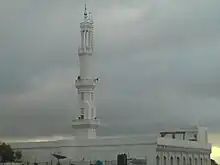
Ervadi Santhanakoodu Festival

The annual Santhanakoodu festival is held at Ervadi dargha, Ramanathapuram district during the Islamic month of Dhu al-Qi'dah commemorating the shahadat anniversary of Qutb Sulthan Syed Ibrahim Shahid badhusha and is celebrated together by Hindus and Muslims.[4]
Transport
The nearest major town to Erwadi is Kilakarai, at a distance of 27 km, which itself falls on NH 49 from Madurai to Rameswaram. Ramanathapuram is the nearest railway station, connecting the village to all major cities in Tamil Nadu. Erwadi is well connected with the border ports of Bay of Bengal as a junction point of fishing steamers.
Education
Following is a list of schools in Erwadi:
- Panchayat Union Middle School
- S.A.B.M.H Government Higher Secondary School
- Elite Matriculation school
- Kadaladi Union Middle School Chinna Ervadi
See also
References
- Vol.1 Edition 6, Mathan 4 Page 42 of Failul Majid Fi manaaqibi Shaheed written by Syed Ibrahim Levvai Aalim and published by Ameer Batcha Aalim Publications, Erwadi Dargah, Ramanathapuram District.
- Sethu Sulthaniyar varalaru written by Dr.S.M.A.Kather, published by Nargees publications, Trichy.
- Edition 3, page 24 of Erwadi Shaheed Nayagam varalaaru, authored by Moulvi.Haji.Marhoom.S.Amjad Ibrahim Levvai Aalim Saahib and published by Ameer Aalim Publications, Erwadi Durgah, Ramanathapuram District, India
- "Urus Festival | Ervadi Dargah | Ervadi | Ibrahim Shahid | Kattupalli | Tamil Nadu Ziyarat | Syed Ibrahim Shahid | Dawate Islam | Religious Healing | Healing Prayers | Faith Healing". 21 November 2010. Retrieved 13 November 2019.
External links
 Media related to Erwadi at Wikimedia Commons
Media related to Erwadi at Wikimedia Commons- 360o travel view of Erwadi's main dargah published by Tamil national daily Dinamalar